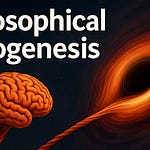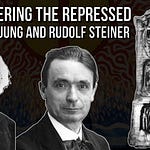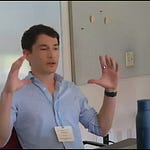Victoria Trumbull sent me her dissertation a few weeks ago: “On the Memory of the Soul: The Spiritualist Metaphysic of Saint Augustine and Henri Bergson” (Oriel College, Oxford). I’ve only had time to read the second chapter critiquing the brain-mind equation, but will certainly be devouring the rest as soon as possible. Victoria indicated it will be published as a book early next year, so stay tuned.
We agreed the reigning “brain-as-hard-drive” picture is a metaphysical mirage: localization of memories in neural tissue (so-called “engrams”), predictive-processing hype, and Shannon-style “information” are smuggled in as if such models were the thing itself. I invited her to unpack why these paradigms, while perhaps useful for engineering purposes, miss the mark when it comes to explaining consciousness. She showed how Bergson (with Plotinus as an important influence) explodes the representational model of mind by emphasizing duration, qualitative change, and the organic continuum of perception.
“The information in the sea of energy around each of us, luminous or mechanical or chemical energy, is not conveyed. It is simply there. The assumption that information can be transmitted, and the assumption that it can be stored are appropriate for the theory of communication, not for the theory of perception. … Shannon’s concept of information applies to telephone hooks and radio broadcasting in elegant ways but not, I think, to the firsthand perception of being-in-the-world, to what the baby gets when it first opens its eyes.”
—J. J. Gibson
On the personal side, Victoria shared how a life-threatening illness cracked her open to a personal, loving Creator and convinced her that philosophy must safeguard the value of personhood against vague forms of spirituality. She senses—like I do—that younger generations are done with smug atheist materialism and hungry for a rigorous, spirit-affirming metaphysics.
Timestamps:
00:01:51 – Why did memory become the focus of your dissertation?
00:05:47 – What’s fundamentally wrong with the “memories-are-stored-in-the-brain” view?
00:16:54 – Can you unpack the flaws in the information-processing metaphor of mind?
00:23:38 – How does talk of “information” in neuroscience slip from metaphor to fact?
00:31:18 – In what way does Bergson separate thinking-activity from language (and why does that matter for AI)?
00:37:50 – How does Bergson rework Plotinus into an evolutionary, creative philosophy?
00:45:36 – Why does Bergson’s notion of duration rule out brain-state accounts of perception and memory?
01:04:31 – Where do you stand on embodiment: is matter privation or creative partner?
01:18:25 – On a personal level, how do your own religious/spiritual convictions shape this work?










